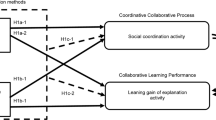Abstract
Learning by doing, such as when learners give explanations to peer learners in collaborative learning, is known to be an effective strategy for gaining knowledge. This study used two types of facilitation technology in a simple explanation task to experimentally investigate those influence on the performance of understanding self’s concept during collaborative explanation activity. Dyads were given a topic about cognitive psychology and were required to use two different theoretical concepts, each of which was provided separately to one or the other of them, and explain the topic to each other. Two types of facilitation were examined: (1) use of a pedagogical conversational agent (PCA) and (2) visual gaze feedback using eye-track sensing. The PCA was expected to enable greater support of task-based activity (task-work) and visual gaze feedback to support learner coordination within the dyads (team-work). Results show that gaze feedback was effective when there was no PCA, and the PCA was effective when there was no gaze feedback on explaining self’s concept. This work provides preliminary implications on designing collaborative learning technologies using tutoring agents and sensing technology.
Access this chapter
Tax calculation will be finalised at checkout
Purchases are for personal use only
Similar content being viewed by others
References
Aleven, V.A., Koedinger, K.R.: An effective metacognitive strategy: learning by doing and explaining with a computer-based cognitive tutor. Cogn. Sci. 26(2), 147–179 (2002)
Aronson, E., Patnoe, S.: The Jigsaw Classroom: Building Cooperation in the Classroom, 2nd edn. Addison Wesley Longman, New York (1997)
Azevedo, R., Cromley, J.: Does training on selfregulated learning facilitate students’ learning with hypermedia? J. Educ. Psychol. 96(3), 523–535 (2004)
Ben Khedher, A., Jraidi, I., Frasson, C.: Assessing learners’ reasoning using eye tracking and a sequence alignment method. In: Huang, D.-S., Jo, K.-H., Figueroa-García, J.C. (eds.) ICIC 2017. LNCS, vol. 10362, pp. 47–57. Springer, Cham (2017). https://doi.org/10.1007/978-3-319-63312-1_5
Biswas, G., Leelawong, K., Schwartz, D., Vye, N.: Learning by teaching: a new paradigm for educational software. Appl. Artif. Intell. 19(3), 363–392 (2005)
Chi, M., Leeuw, N., Chiu, M., Lavancher, C.: Eliciting self-explanations improves understanding. Cogn. Sci. 18(3), 439–477 (1994)
Clark, H.H., Brennan, S.E.: Grounding in communication. In: Resnick, B.L., Levine, M.R., Teasley, D.S. (eds.) Perspectives on Socially Shared Cognition, pp. 127–149. APA Press (1991)
D’Mello, S., Olney, A., Williams, C., Hays, P.: Gaze tutor: a gaze-reactive intelligent tutoring system. Int. J. Hum Comput Stud. 70(5), 377–398 (2012)
Graesser, A., McNamara, D.: Self-regulated learning in learning environments with pedagogical agents that interact in natural language. Educ. Psychol. 45(4), 234–244 (2010)
Greeno, G.J., de Sande, C.: Perspectival understanding of conceptions and conceptual growth in interaction. Educ. Psychol. 42(1), 9–23 (2007)
Harley, J.M., Taub, M., Azevedo, R., Bouchet, F.: “Let’s set up some subgoals”: understanding human-pedagogical agent collaborations and their implications for learning and prompt and feedback compliance. IEEE Trans. Learn. Technol. 11(1), 54–66 (2017)
Hayashi, Y.: On pedagogical effects of learner-support agents in collaborative interaction. In: Cerri, S.A., Clancey, W.J., Papadourakis, G., Panourgia, K. (eds.) ITS 2012. LNCS, vol. 7315, pp. 22–32. Springer, Heidelberg (2012). https://doi.org/10.1007/978-3-642-30950-2_3
Hayashi, Y.: Togetherness: multiple pedagogical conversational agents as companions in collaborative learning. In: Trausan-Matu, S., Boyer, K.E., Crosby, M., Panourgia, K. (eds.) ITS 2014. LNCS, vol. 8474, pp. 114–123. Springer, Cham (2014). https://doi.org/10.1007/978-3-319-07221-0_14
Hayashi, Y.: Coordinating knowledge integration with pedagogical agents. In: Micarelli, A., Stamper, J., Panourgia, K. (eds.) ITS 2016. LNCS, vol. 9684, pp. 254–259. Springer, Cham (2016). https://doi.org/10.1007/978-3-319-39583-8_26
Hill, G.W.: Groups versus individual performance: are N+1 heads better than one? Psychol. Bull. 91(3), 517–539 (1982)
Holmes, J.: Designing agents to support learning by explaining. Comput. Educ. 48(4), 523–547 (2007)
Jermann, P., Mullins, D., Nuessli, M.A., Dillenbourg, P.: Collaborative gaze footprints: correlates of interaction quality. In: Proceedings of CSCL 2011, pp. 184–191 (2011)
Keysar, B., Barr, J.D., Balin, A.J., Brauner, S.J.: Taking perspective in conversation: the role of mutual knowledge in comprehension. Psychol. Sci. 11(1), 32–38 (2000)
Koedinger, K.R., Anderson, J.R., Hadley, W.H., Mark, M.A.: Intelligent tutoring goes to school in the big city. Int. J. Artif. Intell. Educ. (IJAIED) 8, 30–43 (1997)
Kumar, R., Rose, C.: Architecture for building conversational architecture for building conversational agents that support collaborative learning. IEEE Trans. Learn. Technol. 4(1), 21–34 (2011)
Richardson, D.C., Dale, R.: Looking to understand: the coupling between speakers’ and listeners’eye movements and its relationship to discourse comprehension. Cogn. Sci. 29(6), 1045–1060 (2005)
Roschelle, J.: Learning by collaborating: convergent conceptual change. J. Learn. Sci. 2(3), 235–276 (1992)
Rummel, N., Spada, H., Hauser, S.: Learning to collaborate while being scripted or by observing a model. Int. J. Comput.-Supported Collab. Learn. 4(1), 69–92 (2009)
Schneider, B., Pea, R.: Toward collaboration sensing. Int. J. Comput.-Supported Collab. Learn. 4(9), 5–17 (2014)
Schwartz, L.D.: The emergence of abstract representation in dyad problem solving. J. Learn. Sci. 4, 321–354 (1995)
Shirouzu, H., Miyake, N., Masukawa, H.: Cognitively active externalization for situated reflection. Cogn. Sci. 26(4), 469–501 (2002)
Vygotsky, L.S.: The Development of Higher Psychological Processes. Harverd University Press, Cambridge (1980)
Acknowledgments
This work was supported by Grant-in-Aid for Scientific Research (C), Japan Society for the Promotion of Science (JSPS) KAKENHI Grant Number 16K00219.
Author information
Authors and Affiliations
Corresponding author
Editor information
Editors and Affiliations
Rights and permissions
Copyright information
© 2018 Springer International Publishing AG, part of Springer Nature
About this paper
Cite this paper
Hayashi, Y. (2018). Gaze Feedback and Pedagogical Suggestions in Collaborative Learning. In: Nkambou, R., Azevedo, R., Vassileva, J. (eds) Intelligent Tutoring Systems. ITS 2018. Lecture Notes in Computer Science(), vol 10858. Springer, Cham. https://doi.org/10.1007/978-3-319-91464-0_8
Download citation
DOI: https://doi.org/10.1007/978-3-319-91464-0_8
Published:
Publisher Name: Springer, Cham
Print ISBN: 978-3-319-91463-3
Online ISBN: 978-3-319-91464-0
eBook Packages: Computer ScienceComputer Science (R0)




